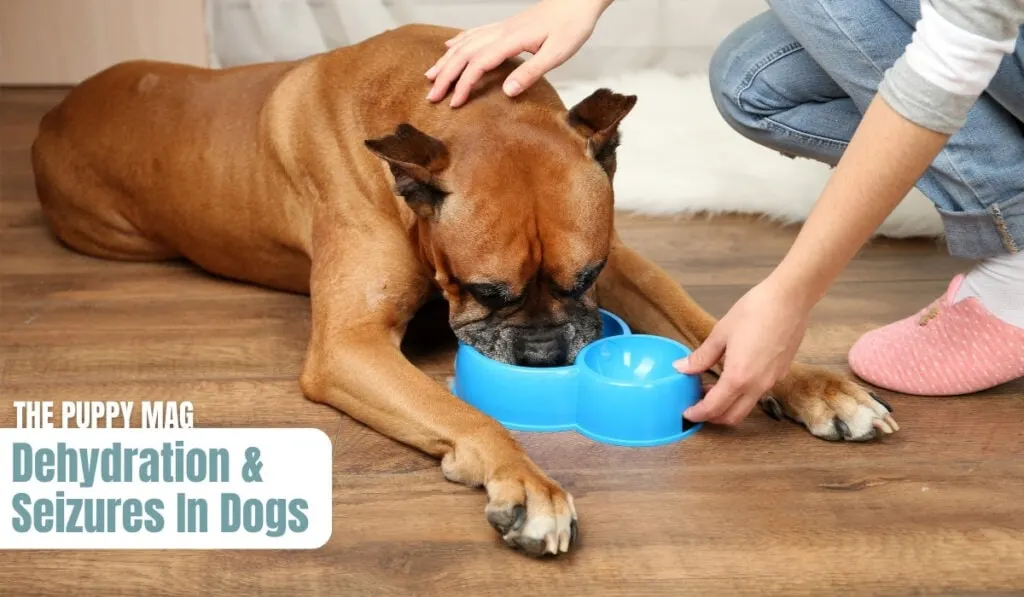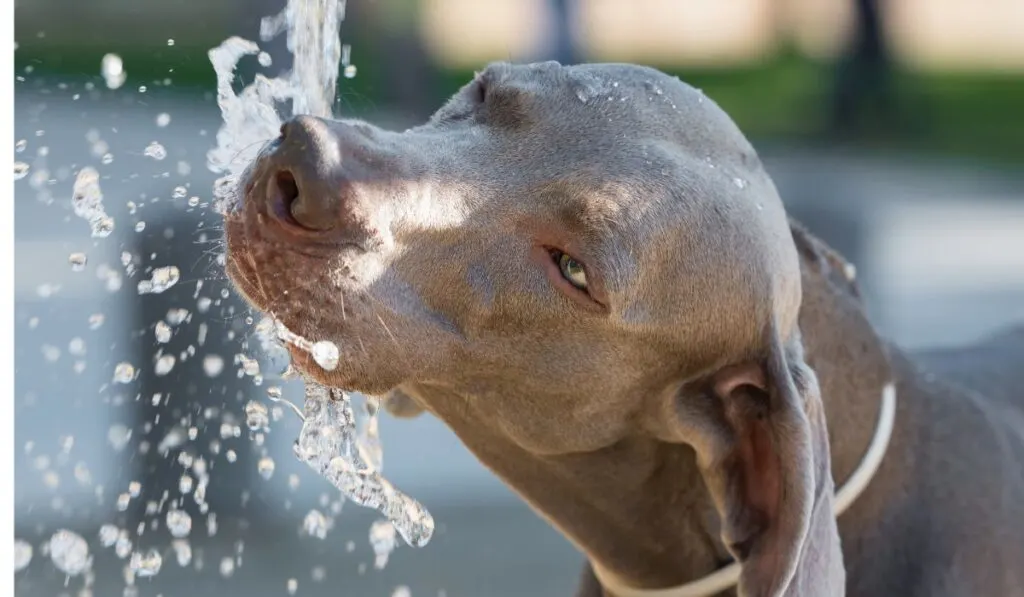Dehydration is a common threat that impacts all living things, dogs included. Not only is dehydration an uncomfortable result of not having enough body fluids, but it can seriously impact a dog’s health.
Dehydration in dogs can lead to various health complications based on severity, with seizures being possible in some of these cases.
So what are the details of dehydration in dogs, and why is it such a big deal? Let’s dive in!

What Is Dehydration In Dogs?
Before we discuss the possibility of seizures in a dehydrated dog, we should first explain what dehydration is in the first place.
If your dog is experiencing dehydration, this means that they are losing more fluids than they are taking in.
The body is unable to simply produce more fluids, which leads to the presence of dehydration in your furry friend.
A dog’s body needs a certain amount of circulating fluids to carry out normal tasks, so any decline in body fluid makes it hard for the organs to function.
Also: Dehydration can also lead to dangerous electrolyte imbalances within the body, causing a waterfall of serious complications.
- Important: Most dogs can live up to 7 days without food, but can only survive 3 days without water. This proves just how important water intake and overall hydration is for your furry friend.
Additional info: Veterinary Emergency Group (VEG)

Can Dehydration Cause Seizures In Dogs?
Although somewhat rare, seizures can happen in dehydrated dogs.
This usually only occurs in dogs that are experiencing significant fluid loss or organ damage as a result of their dehydration, but it is still a potential symptom that we should always be aware of as pet parents.
If your dog is ever experiencing seizures as a result of their dehydration, this means they require immediate and aggressive medical care.
This is not something that you can address at home, so we always suggest having them seen by a vet ASAP.
We also encourage you to keep in mind that while seizures can happen in dehydrated dogs, they are more common in other situations.
The most common causes of seizures in dogs include:
- Epilepsy
- low blood sugar
- Overheating
- kidney or liver disease
- brain tumors
- toxicities
What Causes Dehydration In Dogs?
Did you know that dogs do not sweat like you and I do? Dogs only sweat through their paws, so their fluid loss will have to occur in other ways!
Though dogs may not sweat to the extent that humans do, they can become dehydrated in a lot of the same ways that you and I can.
7 common causes of dehydration in dogs include:
- Repetitive diarrhea
- Repetitive vomiting
- Not drinking enough water
- Overheating
- Illness leading to anorexia or decreased fluid intake
- Persistent fever
- Chronic underlying disease such as kidney disease
No matter the cause of your dog’s dehydration, it will always require immediate assistance from either you or your pet’s medical team.
Dehydration will only continue to worsen if their fluid deficit is not addressed, which is why we should all be aware of the ways in which they can lose water.
How Long Does It Take A Dog To Become Dehydrated?
Dogs can become severely dehydrated in as little as 24 hours.
However, If they are losing a large amount of fluid through things such as vomiting or diarrhea, signs of dehydration may even manifest sooner than the 24 hour mark.
The fact that dogs can become dehydrated so quickly is why your dog’s fluid loss needs to be addressed as soon as possible.
The sooner we jump into action to help our pups, the better chance they have at avoiding any serious health complications.
- If their dehydration is left unresolved past the 24 hour mark, it is more challenging to get them back on track and back to their usual selves.
These pups are more at risk of electrolyte imbalances and organ damage, which is why it is so important to act quickly in these situations.
Other Signs Of Dehydration In Dogs
As we mentioned above, there are many more common symptoms of dehydration that you can be on the lookout for in your pup!
These symptoms will typically occur within 12-24 hours of the fluid loss, and will often worsen if it is not addressed quickly.
Some of the most common signs of dehydration in dogs include:
- Appearing listless and having no energy
- Weakness
- Disorientation
- Vomiting
- Diarrhea
- Sunken appearance around the face and eyes
- Sticky or tacky gums
- Gum color is less pink than usual
- Dry or cracked nose
- Increased panting
- Thick saliva
- Decreased skin elasticity
- Collapse
If you notice any of the above symptoms in your dog, it is very possible that your dog is dehydrated. It takes at least 12-24 hours for dehydration to lead to obvious symptoms in dogs, so this means your pup has been struggling with fluid loss during this time frame.
We urge you to assess your dog’s behaviors and habits for any plausible cause of their dehydration, and to keep a close eye on them in the hours and days that follow.
Additional resource: Memphis Veterinary Specialists – Dog Dehydration
How Can I Hydrate My Dog At Home?
If your dog’s dehydration is a result of something simple such as an active day outdoors, or if you have already sought medical care for their symptoms, then there are a few helpful ways to offer your pup more hydration at home.
Let’s offer a step by step guide on how to give your dog a fluid boost from the comfort of your home.
- Be sure to bring your pup inside to escape the heat if they have spent the day outdoors. Overheating can not only be dangerous for dogs, but it can lead to rapid dehydration. If your dog is experiencing signs of dehydration, it’s a good idea to limit their time outdoors for the next few days to be safe.
- Bring a water bowl to your pup to encourage them to drink small amounts of water at a time. Just be sure only to allow them to drink a few big gulps at a time, as a thirsty pup may chug their water and vomit as a result.
- Add some water to their kibble. This will offer them some extra hydration they don’t usually get, and many dogs love the variety in texture.
- Add something tasty to their water bowl to encourage them to drink more. This could be anything from dog safe fruit to a small amount of low sodium chicken broth. Just be sure to prevent them from drinking the water too fast, as this may cause them to vomit.
The above options for hydration at home are effective, but they only work if your dog is not severely dehydrated, or if they are not suffering from an underlying condition that is leading to more fluid loss.
For example, if your dog is having constant GI upset that has not been addressed by a vet, they will only continue to lose more fluids no matter how much water you are offering them. If you are unable to stay on top of your dog’s dehydration at home, we highly suggest getting them to a vet.
When Should I See The Vet?
If you think your dog might be dehydrated, you may be wondering when you should have them seen by a veterinarian. It can be challenging to know exactly when your pet needs help, especially if their symptoms of dehydration are subtle.
To help you better understand when it is time to ditch at home care and seek veterinary guidance, let’s list some of the situations that warrant veterinary care.
- If your dog is having diarrhea or vomiting
- If your dog has been lethargic for more than 24 hours
- If their symptoms began soon after spending time in the heat outdoors, as they may be experiencing heat exhaustion
- If they have any underlying medical condition that could complicate their situation
- If they feel warmer than usual, as they may have a fever
If your pup is experiencing any of the above complications in addition to their suspected dehydration, we always suggest having them seen by a vet before you attempt to help them at home.
Final Thoughts
As you can see, dehydration is something that should always be taken seriously in our canine companions. We encourage you to keep a close eye on your pup if you fear they are losing fluids for any reason, and to seek professional care if it is ever too much to manage from home!
